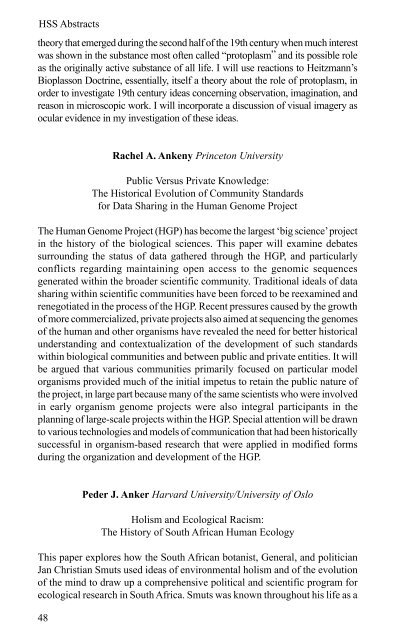2000 HSS/PSA Program 1 - History of Science Society
2000 HSS/PSA Program 1 - History of Science Society
2000 HSS/PSA Program 1 - History of Science Society
Create successful ePaper yourself
Turn your PDF publications into a flip-book with our unique Google optimized e-Paper software.
<strong>HSS</strong> Abstracts<br />
theory that emerged during the second half <strong>of</strong> the 19th century when much interest<br />
was shown in the substance most <strong>of</strong>ten called “protoplasm” and its possible role<br />
as the originally active substance <strong>of</strong> all life. I will use reactions to Heitzmann’s<br />
Bioplasson Doctrine, essentially, itself a theory about the role <strong>of</strong> protoplasm, in<br />
order to investigate 19th century ideas concerning observation, imagination, and<br />
reason in microscopic work. I will incorporate a discussion <strong>of</strong> visual imagery as<br />
ocular evidence in my investigation <strong>of</strong> these ideas.<br />
Rachel␣ A. Ankeny Princeton University<br />
Public Versus Private Knowledge:<br />
The Historical Evolution <strong>of</strong> Community Standards<br />
for Data Sharing in the Human Genome Project<br />
The Human Genome Project (HGP) has become the largest ‘big science’ project<br />
in the history <strong>of</strong> the biological sciences. This paper will examine debates<br />
surrounding the status <strong>of</strong> data gathered through the HGP, and particularly<br />
conflicts regarding maintaining open access to the genomic sequences<br />
generated within the broader scientific community. Traditional ideals <strong>of</strong> data<br />
sharing within scientific communities have been forced to be reexamined and<br />
renegotiated in the process <strong>of</strong> the HGP. Recent pressures caused by the growth<br />
<strong>of</strong> more commercialized, private projects also aimed at sequencing the genomes<br />
<strong>of</strong> the human and other organisms have revealed the need for better historical<br />
understanding and contextualization <strong>of</strong> the development <strong>of</strong> such standards<br />
within biological communities and between public and private entities. It will<br />
be argued that various communities primarily focused on particular model<br />
organisms provided much <strong>of</strong> the initial impetus to retain the public nature <strong>of</strong><br />
the project, in large part because many <strong>of</strong> the same scientists who were involved<br />
in early organism genome projects were also integral participants in the<br />
planning <strong>of</strong> large-scale projects within the HGP. Special attention will be drawn<br />
to various technologies and models <strong>of</strong> communication that had been historically<br />
successful in organism-based research that were applied in modified forms<br />
during the organization and development <strong>of</strong> the HGP.<br />
48<br />
Peder␣ J. Anker Harvard University/University <strong>of</strong> Oslo<br />
Holism and Ecological Racism:<br />
The <strong>History</strong> <strong>of</strong> South African Human Ecology<br />
This paper explores how the South African botanist, General, and politician<br />
Jan Christian Smuts used ideas <strong>of</strong> environmental holism and <strong>of</strong> the evolution<br />
<strong>of</strong> the mind to draw up a comprehensive political and scientific program for<br />
ecological research in South Africa. Smuts was known throughout his life as a
















